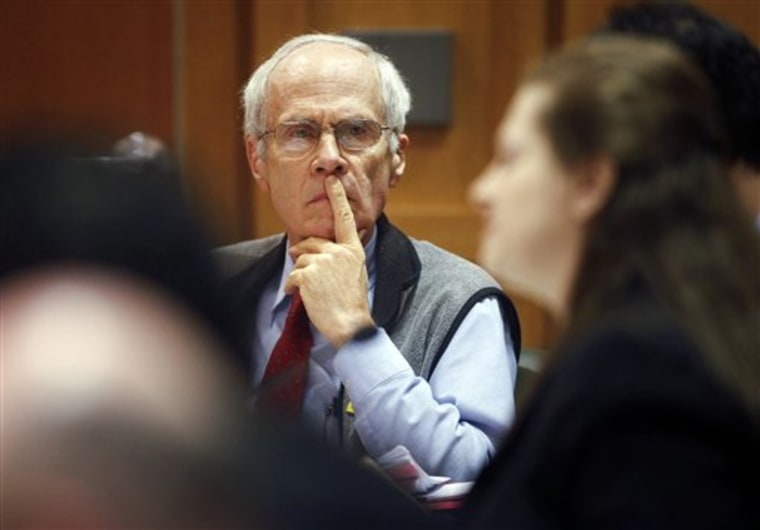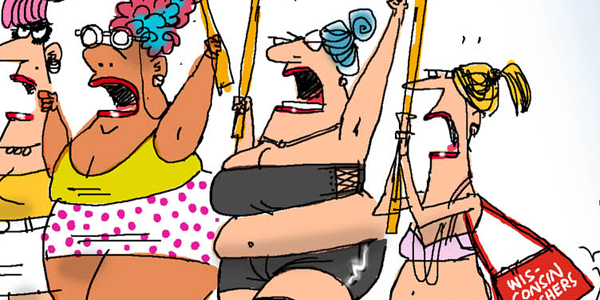The showdown over Wisconsin's explosive union bargaining law shifted from the Statehouse back to the courthouse on Tuesday, but it remained unclear when or even whether the measure would take effect.
Republican lawmakers pushed through passage of the law earlier this month despite massive protests that drew up to 85,000 people to the state Capitol and a boycott by Democratic state senators. Opponents immediately filed a series of lawsuits that resulted in further chaos that might not end until the state Supreme Court weighs in.
That appeared even more likely after a hearing on Tuesday, when a Dane County judge again ordered the state to the law on hold while she considers a broader challenge to its legality. She chastised state officials for ignoring her earlier order to halt the law's publication.
"Apparently that language was either misunderstood or ignored, but what I said was the further implementation of (the law) was enjoined," Dane County Circuit Judge Maryann Sumi said during a hearing. "That is what I now want to make crystal clear."
Slideshow 68 photos
The battle over collective bargaining rights in Wisconsin
Sumi is set to hear additional arguments Friday on the larger question of whether state violated open meetings law during debate on the measure. She also is considering claims by some officials that the law technically took effect last weekend after a state agency unexpectedly published it online.
Whether she decides it did or didn't become law on Saturday, the law's legitimacy will likely be decided by the state Supreme Court, which has not indicated if it would take up an appeals court's request to hear the case.
The back and forth furthered the often angry debate between new Gov. Scott Walker, his Republican allies in the Legislature and the state's public sector unions.
Walker and the GOP have aggressively pushed forward their effort to remove the bargaining rights of state workers, using a surprise parliamentary maneuver to break a weeks-long stalemate to get it passed and then finding another route to publish the law after Sumi's order blocked the secretary of state from doing so.
State Department of Justice spokesman Steve Means said the agency continues to believe the law was properly published and is in effect. Walker's spokesman, Cullen Werwie, didn't immediately return a message seeking comment.
Wisconsin Department of Administration Secretary Mike Huebsch, Walker's top aide, issued a statement saying the agency will evaluate the judge's order.
The law requires most public workers to contribute more to their pensions and health insurance. It also strips away their rights to collectively bargain for anything except wages.
Earlier this month Sumi issued an emergency injunction in the case that blocked Secretary of State Doug La Follette from publishing the law. Republican leaders sidestepped the order, convincing the Legislative Reference Bureau, another state agency, to post the law on its website on Friday. The GOP declared that move amounted to publication and said the law would take effect Saturday.
Dane County Democratic District Attorney Ismael Ozanne — the plaintiff in the lawsuit heard Tuesday — argued the reference bureau can't publish a law without a date from the secretary of state. Attorneys for the state Department of Justice, which is representing the Republicans, argued the case means nothing because legislators are immune from civil lawsuits and the law is in effect.
The district attorney asked Sumi to declare that the law had not been published, but she refused to rule, saying she wanted to hear more testimony. But she issued the new restraining order, warning anyone who violates this one will face sanctions.
"Wisconsin working families hope that (Gov.) Scott Walker and his Republican allies in the legislature will finally begin to respect our state's judicial process and reverse any damage they've done to the working families of our state, Stephanie Bloomingdale, secretary-treasurer of the Wisconsin State AFL-CIO, said in a statement.
Justice Department attorneys maintain Sumi has no authority to intervene in the legislative process. And Assembly Speaker Jeff Fitzgerald, R-Horicon, said in a statement that once again Sumi has improperly injected herself into the legislative process.
"Her action today again flies in the face of the separation of powers between the three branches of government," Fitzgerald said.
The law has been a flashpoint of controversy since Walker introduced it in February.
The measure requires most public workers to contribute more to their pensions and health insurance. It also strips away their rights to collectively bargain for anything except wages. Walker, who wrote the law, insists the measure is necessary to help close the state's budget deficit. But Democrats see the law as a political move to cripple unions, who are traditionally among their strongest campaign supporters.
Tens of thousands of people staged almost non-stop demonstrations at the state Capitol for nearly three weeks and Senate Democrats fled the state for Illinois to block a vote in that chamber.
Republicans who control the Legislature ended the stalemate by removing what they said were the fiscal elements from the plan on March 9, allowing the Senate to vote without a quorum. The Assembly passed the measure the next day and Walker signed the measure into law on March 11.
Dane County Executive Kathleen Falk, a Democrat, and several unions have filed lawsuits challenging the Senate vote, arguing the final law still contains fiscal components. Those lawsuits are still pending.


